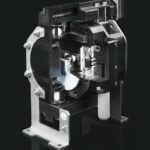Extreme temperatures, hazardous substances, high pressure: If processes in the chemical industry are not carried out safely, the consequences are severe. In the worst-case, accidents and explosions can occur that endanger human life and cause serious injuries to employees. Extending beyond the hazards in the workplace, the quality of the manufactured products must be ensured. If processes are not stable, deviations from the product specifications can occur. The result: inferior or dangerous end products.
Due to the associated high risks, the chemical industry imposes special requirements on the process pumps used. Correct selection, installation, maintenance and monitoring make it possible to carry out chemical processes safely and efficiently. Components must be resistant to chemicals and corrosion, and often they must also be explosion-proof. Many requirements that Timmer meets with its Timchem double diaphragm pumps. This starts with deliberate use of suitable pump materials. For example, stainless steel, which has proven to be effective in other industries, is often not suitable for chemical applications because it is subject to attack by alkalis and acids. Instead, the pumps in the Timchem product line are equipped with a polytetrafluoroethylene (PTFE) housing.
Reliable protection
The optimum choice of materials must be considered holistically and it must be optimised even at the level of the individual pump components. For instance, threaded sleeves that are screwed into the plastic housing, are common on the market. External influences such as significant temperature fluctuations change the shape of the material, and the housing then tends to leak at the connections. Timmer, on the other hand, uses a design for its pumps that connects the highly-resistant plastic components that are in contact with media, by means of tie rods. The force exerted by the tie rods is distributed by the large-area reinforcement plates – a measure that minimises deformation of the plastic. The Timfix system uniformly distributes the forces of the tie rods – and minimises plastic deformation.
To ensure maximum protection, stainless steel sheets encompass the pump and provide stability for the entire construction. In the interior of the pump, metal does not come into contact with the medium. Plastic only, which has been tested for resistance, completely encloses the processed medium. Moreover, the material is FDA-compliant and thus it is food-safe. This is a property, which at first glance may not seem relevant in the chemical industry. However, in this regard it is worth taking a look behind the scenes. The chemical industry is significantly involved in the manufacture of pharmaceutical products. Even if the end product, such as a common pain-relief tablet, does not come into contact with the chemical pump – the specific substances that make up the pain-relief tablet, do indeed pass through the chemical pump in various processes. Thus, with Timmer chemical pumps these upstream products only come into contact with materials that are FDA-compliant.
Optimal sealing and Atex-compliance
Optimal sealing of a pump is a major aspect of process reliability. The fewer sealing surfaces, the fewer possibilities of a leak. Consequently, Timchem chemical pumps have only four sealing points. Also the individual components are perfectly matched. Not only are the selected components safe and leak-proof, they can also be replaced quickly if need be. The design enables fast and easy on-site service. In this area, less is more, because the minimised number of wear parts reduces maintenance effort and maintenance costs. Although design effort and use of high-quality materials initially result in higher investment costs, these costs quickly pay for themselves in practice in the form of longer service life and less maintenance effort. This is something that users in the chemical industry really appreciate.
In addition to reliable sealing and durable pump materials, there is yet another factor that plays an important role in the chemical industry: Explosion protection. Timmer designs and manufactures chemical pumps that meet the requirements stipulated in this directive. Atex-compliance is achieved in part through high-quality material selection and the combination of materials. For example, such material selection and combination minimise potentially explosive electrostatic charges. It also enables implementation of process-reliable chemical pumps in different types of hazardous areas.
Easy access for repairs
If in spite of high quality standards, a pump should fail, fast repair is essential in the chemical industry. Timmer chemical pumps come factory-standard with an intelligent sensor for condition monitoring. Integrated in a process control system the sensor shows the real-time status of the pump and by means of an additional system, immediately sounds an alarm as soon as an error occurs. The company decides how the pump should be integrated into the system and what data it should display. If an error message occurs and if repairs are required, service technicians benefit from the easy accessibility offered by the pumps. For example, valve balls and valve cages can be replaced without dismounting the side covers. Use of special tools is not necessary.
The heart of the pump, a special, extremely low-wear, ceramic latching valve, ensures smooth operation. All of the valve‘s friction pairs are made of ceramics in conjunction with precision-ground, high-performance plastics. The result is minimum wear in the valve itself. To increase the service life of the diaphragms, Timmer relies on the short-stroke principle. The reduced stroke path provides long-term protection of the diaphragm.
Timmer GmbH , Neuenkirchen, Germany










